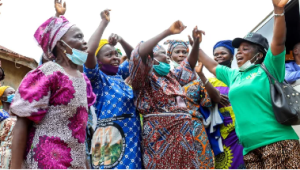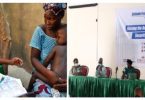Women, the gender that brings forth and nurtures life, are often carelessly referred to as the ‘weaker vessel‘. This is the undisguised perception of women in Nigerian society by their male counterparts. Not limited to Nigeria, the poor and unfair stereotyping 0f women is actually quite common in many places worldwide. Women are often seen as lacking in physical or emotional strength. Which means the larger percentage of men in our patriarchal society do not easily acknowledge the resilience or mental capacities of this peculiar gender. Or the fact that these qualities of women make them advocate more for peaceful, quality-above-quantity home building and nation building. Herein lies the age-old challenge of gender inequality.


The Challenges Faced by Women in Nigerian Society
Women are our mothers, sisters, wives, grannies, and daughters. They are at the forefront of nurturing and sustaining the home day in, day out. They are the fortress to lean on, the go-to person when critical help or counsel is needed by male family members. Unfortunately, to be counted amongst women in Nigerian society means you will face certain constraints and discriminations. The challenge of womanhood in Nigeria became even more pronounced with the advent of certain discriminatory practices of the British colonialists against women. These discriminations took a deep root in political, cultural, and religious practices in post-colonial Nigeria.
Thanks to the gradual increase in the enrolment of female children in schools. Women in Nigerian society are progressively becoming more economically empowered to take responsibility for themselves, as they move up the social ladder. We might want to find out just how empowered are Nigerian women in the modern day. The statistics of economic, social, and political empowerment of women in Nigerian society is still quite gloomy, as we shall soon see.
For a long time, women in Nigerian society have faced significant gender discriminations. In the workplace, religious gatherings, cultural setup, immediate and extended family, and in politics. Nigerian women have had limited access to quality education, healthcare, political decision-making and economic earning power. Women in Nigerian society also face poverty, sex trafficking, sexual abuse, domestic abuse, girl child labour, and other forms of violence. Some cultural practices also hinder women from having a voice, or outrightly harm them. These include female genital mutilation, child marriage, seclusion of women in homes (very common in Northern Nigeria), and lack of family inheritance rights.
Women are generally seen as physically incapable of achieving the same results (or success) as their male counterparts in the corporate world. Hence they are often paid lower compensation than their male counterparts for the same managerial and/or leadership roles.
Comparing the Experiences of Nigerian Women Across Different Cultures
The experiences and social roles of women vary from one culture and geographical location to another. For instance, women in southern Nigeria have more active roles in social and cultural life than those in the North. In traditional society, the Igbo and Yoruba women were known to hold important family, social, and political positions in pre-colonial Nigeria. To a certain extent, these practices are still in existence. Even in the North, there were female monarchs and political officers in Hausa and Borno empires of pre-colonial Nigeria (Queen Amina of Zaria for instance).
However, the British overlords took certain actions to deliberately ignore or silence women during the colonial era. Thus many Nigerian females were denied access to education and work opportunities in favor of the menfolk. The British rulers considered men to be more agile and useful to them than the women. All these acts contributed badly to the reduced economic power of Nigerian women for a long time.
Yet again, the mortality rate of Nigerian mothers is the highest across Africa, and the fourth highest around the world as we speak. This is largely due to inadequate healthcare. Child marriage, early pregnancy, induced abortions, and malnutrition are primary factors contributing to this high mortality rate. It is far worse in Northern Nigeria than in the South, due to the prevalence of child marriage in that region. Women and girls in Nigeria have also been observed to feed less than the males. They are made to do more household work, and their movements are more restricted than those of men.
Improving the Lot of Nigerian Women: Various Reforms
For a long time, the Nigerian justice system ignored women in cases of domestic violence. And many women would not speak up for fear of derision or lack of support from their families and law enforcement officers.
Yet again, Nigerian women acquired voting rights as late as in 1979. But till date, women representation in Nigerian politics is very low. Several women are either bullied or outrightly denied participation in political affairs. There is only one case in history where a Nigerian state was ruled by a female governor. Namely Dame Virginia Etiaba in Anambra state (2006 to 2007). Aside this, no state in Nigeria is governed by a woman (which has been the case for many years). In the 2023 elections, women were only able to clinch 15 out of 423 legislative seats (both in the Senate and House of Representatives). In 2019, only 18 female lawmakers were elected into office.
However, women advocacy groups have continued to press for better representation of women in social and political life. Such groups include Women in Nigeria (WIN), Women Advocates Research and Documentation Centre (WARDC), and the Nigerian Women Trust Fund (NWTF).
In fact, NWTF and WARDC have publicly declared a “Nigerian Women Charter of Demand” since 2014. They have consistently demanded to have 35% of women incorporated in all sectors of government. And they have the able backing of the Ministry for Women Affairs and Social Development, as well as the United Nations Women group.
These women advocacy groups have also continued to assist and empower Nigerian women through training, funding, mentoring, and networking activities. An increased focus on educating and empowering women and girls is ongoing. And for the record, more girls continue to excel in academics, including female children from poor backgrounds.
Conclusion
All in all, the journey to meaningful women participation and gender equality in Nigeria is an ongoing project. It may take years to perfect it. But we believe there is light at the end of the tunnel. And that women in Nigerian society deserve to be respected and treated with equity.







